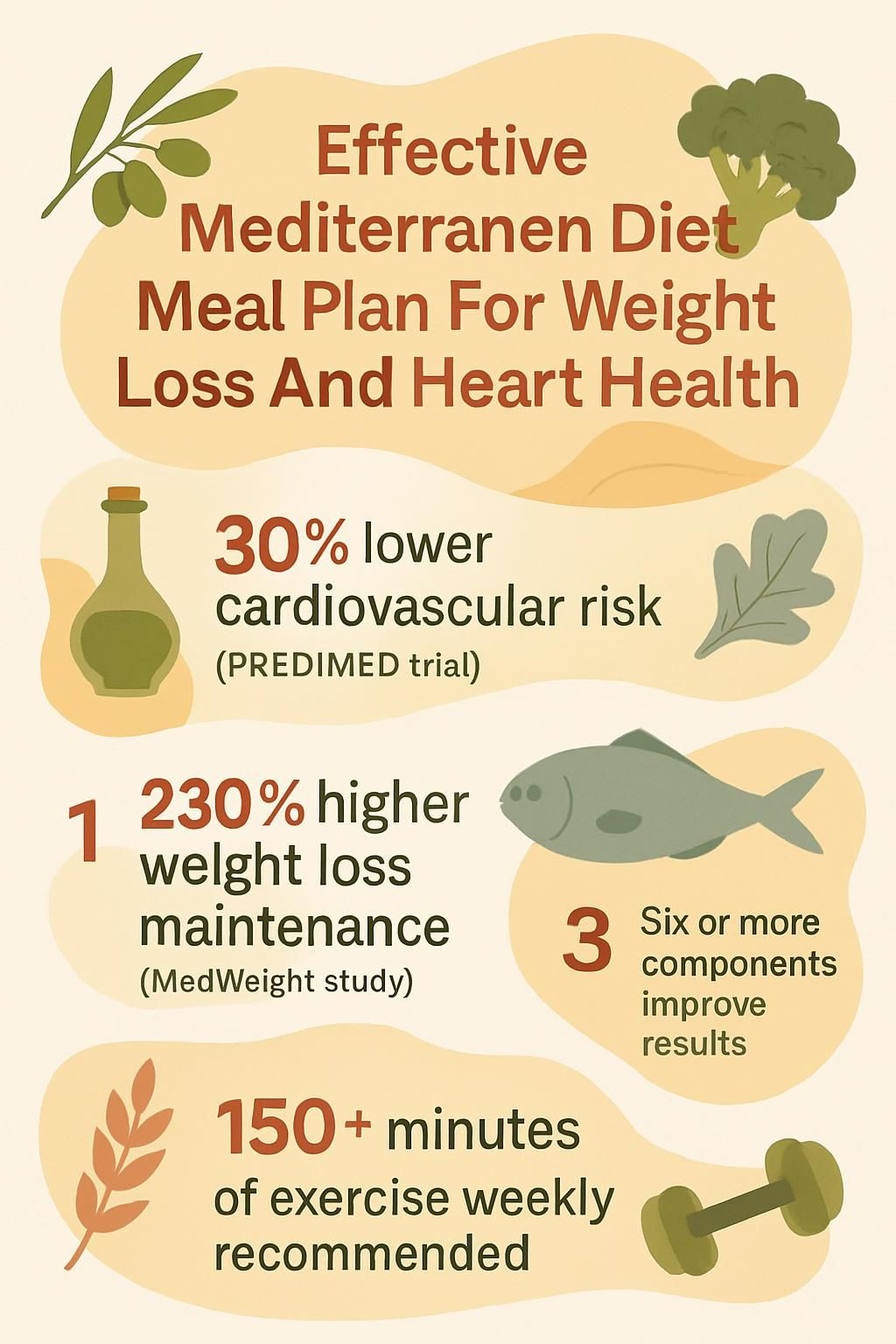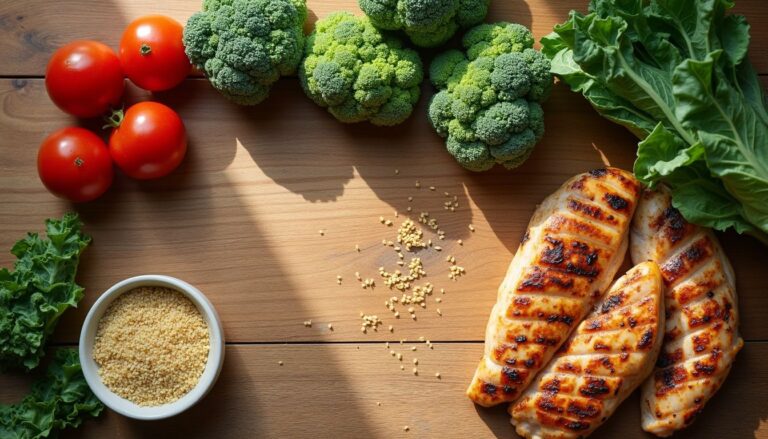Effective Mediterranean Diet Meal Plan For Weight Loss And Heart Health
Our Nutrition Assistant AI Suite will transform your body. You will lose fat, get toned, and build muscle. Gain confidence and optimal health.
If you struggle with weight gain or want better heart health, you are not alone. A well-built Mediterranean diet can support weight loss and lower the risk of heart disease. Research also links this eating plan to steady energy and fewer cravings.
In this guide, you will find a simple meal plan, a clear food list, and tips you can use today. Each section blends science and practical steps, so you can build meals with confidence.
Key Takeaways
- The Mediterranean diet centers on plant foods, whole grains, olive oil, fish, and modest wine. It limits red meat and heavily processed foods.
- Large trials, such as PREDIMED (2013), report about a 30 percent lower risk of major cardiovascular events. Many participants saw lower LDL and higher HDL cholesterol.
- The MedWeight study (2022) found that strict adherence to six or more components raised the odds of long-term weight-loss maintenance by more than double across follow-up.
- Sample meal plans rich in whole grains, legumes, vegetables, fruit, fish, and nuts can support gradual weight loss and heart health.
- Experts suggest pairing the diet with at least 150 minutes of moderate exercise each week and daily hydration for better weight control and metabolic health.

Understanding the Mediterranean Diet

A guide to the Mediterranean diet explains how people around the Mediterranean Sea built an eating pattern that supports health. Think of it as a daily blueprint for balanced meals, not a strict set of rules.
What Is the Mediterranean Diet?
The Mediterranean diet reflects traditional meals from countries near the Mediterranean Sea in the mid-20th century. It features vegetables, fruits, beans, lentils, nuts, and seeds as the base of most plates.
Whole grains and extra-virgin olive oil, often called EVOO, appear daily. The plan includes fish that are rich in omega-3 fatty acids, modest amounts of cheese and yogurt, and small portions of red meat.
Desserts and sugary drinks stay limited. If you drink alcohol, stick to modest wine with meals.
Processed foods, butter, and added sugar are minimized. Herbs and spices supply flavor, which helps you keep salt low.
This eating pattern links to weight loss and lower risk for chronic diseases like type 2 diabetes, obesity, and high blood pressure. Many people also see better cholesterol numbers and more stable blood sugar.
The Mediterranean Diet is not just food; it’s a lifestyle built on balance and tradition.
Why Does the Mediterranean Diet Have Cultural and Historical Importance?
People in Mediterranean countries have modeled this pattern for generations. Meals often reflect local traditions, such as cooking together and sharing food at the table.
Family time at meals is common. Eating slowly and talking together makes food more than fuel. It becomes a daily ritual that supports both health and community.
The Mediterranean Diet Pyramid highlights olive oil, whole grains, fruits, vegetables, legumes, and fish as the base of daily meals. This design differs from older American guides that placed more emphasis on refined grains.
There is a strong focus on seasonal, local ingredients and simple techniques. During a trip to Greece, I joined a village supper where neighbors shared tomatoes, olives, and bread from local markets. The sense of community made the food taste even better.
Key Components of the Mediterranean Diet
This eating plan brings together foods that help manage weight and support heart health. Each component adds nutrients your body needs for steady energy and long-term wellness.
Why Are Whole Grains and Legumes Important?
Whole grains and legumes form a core part of the plan. Aim for 3 to 6 servings of whole grains or starchy vegetables daily, such as brown rice, oats, barley, quinoa, or whole wheat bread.
One serving equals about half a cup of cooked grains or one slice of bread. These complex carbohydrates digest slowly and help stabilize blood sugar.
Beans and lentils should appear in meals at least three times a week. Add a half cup to salads, soups, grain bowls, or dips like hummus.
Because legumes contain plant protein and fiber, they promote fullness and good digestion. Studies also connect higher legume intake with lower LDL cholesterol and reduced risk of coronary artery disease.
How Do Fruits and Vegetables Benefit the Mediterranean Diet?
Aim for at least three servings of fruit and three servings of vegetables daily. One serving of fruit is about half to one cup. For vegetables, think one cup raw or half a cup cooked.
Include vegetables at every meal. Popular options include mixed greens, cucumber salad, and fennel with orange and mint. The fiber helps manage weight and supports gut health.
Fruits and vegetables are rich in vitamins, minerals, and antioxidants that reduce inflammation linked to heart disease and cancer. Keeping sliced carrots or cucumbers ready makes healthy snacking easier.
Higher produce intake is tied to lower blood pressure and improved cholesterol. Colorful plates also add flavor without many calories.
What Are the Advantages of Healthy Fats Like Olive Oil, Nuts, and Seeds?
Extra-virgin olive oil contains antioxidants called polyphenols that protect the heart and brain. Use 1 to 4 tablespoons a day in place of butter or other solid fats.
EVOO can help reduce inflammation and support healthy cholesterol levels. It is the main fat used for cooking and dressing in this plan.
Nuts such as almonds, walnuts, and hazelnuts provide plant omega-3s and fiber. Aim for at least three servings per week. Choose raw, unsalted, or dry-roasted options.
Peanut butter and other nut butters fit, as long as they are low in added sugar and sodium. Seeds like chia or flax add fiber that supports digestive health.
In my own kitchen, I swapped butter for olive oil on whole-grain toast and added nuts to breakfast. I stayed full longer and enjoyed the taste more.
Why Are Fish and Poultry Essential in the Mediterranean Diet?
Fish and poultry supply lean protein and important fats. Include fish at least three times each week, 3 to 4 ounces per serving. Salmon, sardines, tuna, mackerel, and herring are rich in omega-3 fatty acids.
Omega-3s support heart health and can help lower triglycerides, which are blood fats. The American Heart Association supports regular fish intake for these benefits.
Eat poultry up to once a day, keeping portions near 3 ounces. Baked, broiled, or grilled white-meat poultry without skin contains less saturated fat than red meat.
Research shows that replacing red meat with fish and poultry lowers heart disease risk and aids weight maintenance.
How Should You Limit Red Meat and Processed Foods?
Swap more red meat for fish and poultry. Keep red meat like beef, pork, veal, or lamb to one small serving per week, about 3 ounces, and choose lean cuts.
This limit aligns with guidance from health agencies and long-term cohort studies. The goal is better heart health and lower saturated fat intake.
Processed foods and commercial baked goods should be rare. Homemade baked items can fit, but keep them to three servings per week. Avoid refined carbs like white bread and white rice, along with sugary drinks.
For me, trading sweets for whole grains and fruit helped my energy and supported weight loss. These changes also support a healthier gut microbiota.
How Can Herbs, Spices, and Natural Flavorings Be Used Effectively?
Herbs and spices add bold flavor without extra salt. Sprinkle oregano, basil, rosemary, or mint onto roasted vegetables or lean proteins.
Use garlic and lemon for a bright, low-sodium boost. Infuse olive oil with herbs for dressings or marinades instead of using butter-based sauces.
Sweet dishes can rely on cinnamon or nutmeg for flavor. Yogurt with cinnamon and fresh fruit makes a simple dessert.
Season cottage cheese with mustard seed, black pepper, or paprika for a savory snack. Many classic Mediterranean recipes let fresh herbs shine and limit heavy sauces.
Weight Loss Benefits of the Mediterranean Diet
This pattern supports gradual weight change, which is easier to maintain. Many dietitians consider it effective and realistic for long-term success.
How Does the Mediterranean Diet Support Sustainable Weight Loss?
Sustainable weight loss comes from steady adherence. In the MedWeight study, people who followed at least six core components had much higher odds of maintaining weight loss over time.
The plan emphasizes fruits, vegetables, whole grains, legumes, fish, nuts, and olive oil. These foods are nutrient dense and filling, which helps reduce cravings.
Because the diet offers variety and focuses on quality, it is easier to follow. Limiting red meat and processed foods reduces extra calories and saturated fat.
Which Nutrient-Dense Foods Help Reduce Cravings?
Beans, lentils, nuts, fruits, and vegetables help control hunger. Fiber slows digestion and keeps you full for hours, which makes snacking less tempting.
Almonds or walnuts offer a mix of healthy fat and protein for steady energy. In MedWeight, each extra weekly serving of fruit was linked with better weight maintenance.
Antioxidant-rich foods protect your cells from inflammation. Sweet potatoes and broccoli deliver vitamins and fiber for lasting energy. Avocado adds filling, healthy fats that tame hunger.
What Are Effective Strategies for Long-Term Weight Management?
Base most meals on whole grains, fruits, vegetables, and healthy fats. This approach limits processed food and helps regulate appetite.
The MedWeight study followed 565 adults who lost at least 10 percent of their body weight. Many kept the weight off for years, showing the value of routine and consistency.
Include both aerobic exercise and strength training each week. A simple plan might be brisk walking plus two short strength sessions. Meal prep helps you avoid impulsive choices when life gets busy. I prep vegetables and proteins on Sundays, which keeps my week on track.
Mediterranean Diet and Heart Health
Think of this plan as daily care for your heart, one plate at a time.
How Does the Mediterranean Diet Affect Cholesterol Levels?
This eating pattern keeps saturated and trans fats low and raises healthy unsaturated fats. Olive oil, nuts, seeds, and fatty fish help improve blood lipid profiles.
Studies link the Mediterranean diet with lower LDL cholesterol and stable or higher HDL cholesterol. In a large 2013 trial, cardiovascular risk dropped by about 30 percent among followers.
I replaced packaged snacks with fruit, nuts, and Greek yogurt. A few months later, my LDL dropped by almost 20 points. Small swaps can add up.
Altogether, reducing bad fats and adding good ones supports healthier cholesterol numbers.
In What Ways Does It Help Reduce Blood Pressure?
The plan supports lower blood pressure by keeping sodium moderate and boosting potassium from fruits and vegetables. Nuts, whole grains, and dairy also contribute key minerals.
Studies show lower systolic and diastolic blood pressure compared to higher-sodium diets. Many people also crave fewer salty snacks because herbs and spices add plenty of flavor.
Within a few months, consistent habits can improve markers of heart health. The result is steadier blood pressure over time.
How Does the Diet Lower Risks of Cardiovascular Disease?
The Mediterranean diet can lower the risk of heart attacks and strokes. Whole grains, nuts, and olive oil improve cholesterol and blood sugar control.
Replacing red meat with fish and poultry provides lean protein and omega-3 fats. These changes support heart function and reduce inflammation.
Fruits, vegetables, and legumes bring antioxidants and fiber that support blood vessels and a healthy gut microbiota. Studies in major journals, including the New England Journal of Medicine, report about a 30 percent lower risk of major cardiovascular events with good adherence.
Many people also see a lower risk of metabolic syndrome. These benefits support long-term health.
Sample Mediterranean Diet Meal Plan
Use this Mediterranean diet meal plan as a flexible guide. It will help you build balanced plates and steady habits throughout the week.
What Are Healthy Mediterranean Diet Breakfast Ideas?
Start with whole grains, fruit, nuts, and lean protein. These meals support steady energy and heart health.
- Steel-cut oats with berries and flaxseed provide fiber and antioxidants. This meal helps regulate cholesterol and keeps you full longer.
- Whole-grain toast with nut butter and a smoothie blends healthy fats with vitamins. Nuts like walnuts or almonds offer extra omega-3s for heart support.
- Greek yogurt with fruit and walnuts packs protein and probiotics. Fresh berries or sliced apples add natural sweetness without refined sugars.
- Egg white omelet with vegetables like spinach and tomatoes provides lean protein and key nutrients. Add a drizzle of olive oil for healthy fat.
- Cottage cheese with sliced peaches or pears balances calcium and potassium. Sprinkle chia seeds for extra fiber.
- Avocado on whole-grain bread with sunflower seeds combines good fats and fiber. This meal supports stable blood sugar.
- Quinoa breakfast bowl with raisins and chopped hazelnuts includes complete plant protein. Quinoa is gluten-free and fits many preferences.
These breakfast ideas align with Mediterranean diet fundamentals. Next, consider these simple lunch options.
What Are Easy Lunch Options for the Mediterranean Diet?
Mediterranean lunches offer variety, flavor, and heart-smart nutrition. Prep ahead to make midday choices easier.
- Bulgur salads with chopped vegetables, chickpeas, and olive oil supply fiber, protein, and healthy fats. Prepare in advance for grab-and-go meals.
- Whole-grain pasta salads with cherry tomatoes, cucumbers, feta, and herbs deliver vitamins and antioxidants in every bite.
- Roasted portobello sandwiches with vegetable soup create a filling meal that supports weight management.
- Toasted quinoa salad with grilled salmon provides complete protein and omega-3 fats, plus vitamin D and selenium.
- Grain bowls with leafy greens, roasted nuts, olives, and grilled chicken bring balanced macronutrients and a satisfying crunch.
- Meal prep lentil or bean salads with lemon juice and extra-virgin olive oil for busy days. This keeps you on plan.
- Greek yogurt bowls layered with fruit and chopped walnuts offer probiotics, protein, and heart-healthy fats.
Which Dinner Recipes Reflect the Mediterranean Diet?
Evening meals can be simple and flavorful. Focus on fresh produce, whole grains, and lean protein.
- Make salmon with mango salsa for a bright, nutrient-rich plate. Omega-3-rich salmon supports heart health, while the salsa adds vitamins and fiber.
- Cook cod with lentils using olive oil and fresh tomatoes. Cod brings lean protein and lentils deliver fiber that supports fullness.
- Roast chicken and serve it over cannellini beans with mixed greens. This meal offers lean poultry, filling legumes, and olive oil for flavor.
- Prepare chickpea and spinach pancakes with sesame cucumber salad. This vegetarian dinner supplies plant protein and iron.
- Grill black bean burgers and pair with roasted beets. Beans provide protein and slow-digesting carbs; beets may help with blood pressure.
- Bake a lighter pizza on whole wheat crust with tomato sauce and vegetables. Add a small sprinkle of nuts like sliced almonds or walnuts for crunch.
- Toss a fennel, orange, and mint salad as a fresh side. It brings vitamin C and a clean finish to the meal.
During a busy week, I prepped vegetables and fish on one evening. Quick assembly later saved time and kept me consistent.
What Snacks and Desserts Fit the Mediterranean Diet?
Snacks and desserts can still fit your goals. Choose nutrient-dense options that taste good and keep portions reasonable.
- Snack on mixed nuts and seeds for healthy fats, protein, and fiber. A small handful, about 28 grams, works well.
- Pick seasonal fruit like oranges, grapes, or figs for natural sweetness. Fruit adds vitamins and antioxidants.
- Combine nonfat Greek yogurt with a few squares of dark chocolate for balance. You get protein, probiotics, and flavonoids.
- Pair whole-grain crackers with hummus for fiber and plant protein. Chickpeas help steady blood sugar.
- Try raw veggies with a simple yogurt dip. This adds vitamins and calcium with little added sugar.
- Limit homemade baked goods to three servings per week. Use fruit or yogurt to sweeten muffins or cakes.
- Prepare small portions of dried fruit or unsweetened applesauce as quick snacks. These satisfy a sweet tooth with fewer calories than packaged sweets.
Keep a short list of go-to snacks. This helps you stay on track when hunger hits.
Practical Tips for Success on the Mediterranean Diet
You can strengthen adherence with small, repeatable habits. These practical moves reduce friction and make healthy eating easier.
How Can You Manage Portion Control and Practice Mindful Eating?
Use smaller plates and bowls to limit portions without counting every bite. Aim to fill half your plate with vegetables at main meals.
Choose whole grains like brown rice or quinoa over refined grains. These foods control hunger better and support steady blood sugar.
Eat slowly and notice your fullness. Try to avoid screens at meals so you can focus on hunger cues. I portion trail mix into small containers, which helps me avoid overeating.
How Should Physical Activity Be Integrated with the Diet?
Pair this eating plan with movement for best results. Aim for at least 150 minutes of moderate activity per week. For example, walk briskly for 30 minutes, five days a week.
Mix in strength training to support muscle and metabolism. Activities like jogging, dancing, hiking, or yoga can keep things interesting.
Pick activities you enjoy so the routine sticks. Walking with a friend or group keeps many people motivated.
Why Is Staying Hydrated Important?
Water supports digestion, temperature control, and nutrient absorption. Aim for at least eight cups daily, and more if you live in a warm climate or exercise regularly.
Good hydration helps your body handle fiber from whole grains and legumes. It can also reduce mindless snacking. I feel more alert when I keep a water bottle nearby.
Simple habit, big payoff. Hydration supports the full benefits of this plan.
Overcoming Common Challenges with the Mediterranean Diet
New habits can feel awkward at first. With a few tools, you can make this pattern fit your life.
How Can You Adjust to the Mediterranean Lifestyle?
Cook more often at home using seasonal produce. Invite family or friends to help, which adds social support and makes meals more enjoyable.
Share meals at a table, not in front of a screen. Slower eating improves satisfaction and portion control.
Build casual activity into your day, such as a short walk after dinner. Plan meals around vegetables, whole grains, and olive oil. Use herbs and spices instead of heavy sauces.
What Are Cost-Effective Ways to Buy Fresh, Quality Ingredients?
Choose produce in season for better price and flavor. Oranges often cost less in winter, while tomatoes are cheaper in summer.
Buy whole grains and legumes in bulk bins to save money. Many stores offer weekly flyers and digital coupons that lower your total cost.
Affordable access makes adherence easier. A simple plan and a list can prevent impulse buys.
How Can You Maintain Consistency in Meal Preparation?
Create a weekly plan and stick to it. Use a calendar or meal planning app to schedule recipes and grocery needs.
Prep snacks like nuts, cut fruit, sliced vegetables, and whole-grain crackers with hummus. Ready-to-eat options reduce last-minute trips for processed foods.
Pick a set time each week to batch-cook grains, prep vegetables, and portion proteins. Store items in clear containers so meals come together quickly after a long day.
Scientific Evidence Supporting the Mediterranean Diet
Evidence from large trials and cohort studies supports weight control and heart benefits. The strongest research points to consistent adherence over time.
What Research Supports the Mediterranean Diet for Weight Loss?
The MedWeight study tracked 565 adults who lost at least 10 percent of their weight. Those in higher adherence quartiles had better odds of maintaining the loss.
For example, the third quartile showed an odds ratio of 2.30, and the fourth quartile had an odds ratio of 1.88 for maintenance. Stronger adherence helped people keep weight off.
PREDIMED-Plus followed participants for 12 months and reported continued weight loss with Mediterranean-style eating. A structured, lower-energy phase with this plan led to significant weight loss without regain at one year.
For me, focusing on these foods cut cravings and made weight loss feel achievable without extreme rules. Seek guidance from a registered dietitian if you have medical conditions.
Which Studies Show Heart Health Benefits?
In the PREDIMED trial from Spain, more than 7,000 adults followed a Mediterranean diet or a low-fat plan. The Mediterranean group had about a 30 percent lower risk of heart attack, stroke, or cardiovascular death.
Other studies in major journals have confirmed these results. Higher intake of olive oil, nuts, fruits, and vegetables is linked to better cholesterol and lower blood pressure.
People often experience fewer cardiovascular events and better longevity with strong adherence. These benefits appear even without strict calorie counting.
Foods to Avoid on the Mediterranean Diet
Some items work against your goals. Limiting them supports weight management and heart health.
Why Should Processed and Packaged Snacks Be Avoided?
Many packaged snacks are high in added sugar, sodium, and unhealthy fats. These can raise blood pressure and cholesterol, and they add many empty calories.
Preservatives and artificial additives also raise concern for heart health. A 2022 study linked higher intake of ultra-processed foods with greater cardiovascular risk.
Heavily processed cheeses and meats, as well as packaged cookies and cakes, do not match the plan. Cutting these snacks strengthens adherence and improves long-term health.
What Are the Risks of Refined Sugars and Flours?
Foods high in added sugar, such as baked goods and ice cream, push you off track. They add calories with little nutrition and can drive overeating.
Refined grains like white bread and white rice cause quick blood sugar spikes. The drop that follows often leads to more hunger and more snacking.
Research links high intake of refined sugars and flours to obesity, type 2 diabetes, and heart disease. Choosing whole grains and fruit-based sweets helps steady energy.
Why Are Trans Fats and Saturated Fats Harmful?
Trans fats and high amounts of saturated fat raise LDL cholesterol, which raises the risk of heart disease and stroke. Many processed snacks and spreads contain these fats.
Researchers also connect trans fats with inflammation that harms blood vessels. The Mediterranean diet avoids these fats and relies on olive oil instead.
After I cut back on processed snacks and switched to olive oil, my energy improved and my cholesterol numbers looked better at my next check. Studies from recent years show lower heart disease rates when these fats are limited.
Adapting the Mediterranean Diet for Different Lifestyles
You can adapt this plan to fit your needs. The core idea stays the same, which is plants first, healthy fats, and lean protein.
What Are Vegetarian and Vegan Mediterranean Diet Options?
Vegetarian and vegan styles work well within this pattern. Focus on plant protein and a wide mix of produce, grains, nuts, and seeds.
- Replace fish, poultry, and red meat with plant proteins like chickpeas, lentils, and white beans in main dishes.
- Snack on nuts and seeds for healthy fats and staying power between meals.
- Use olive oil as your main cooking fat and dressing.
- Fill half your plate with seasonal vegetables such as tomatoes, cucumbers, and leafy greens.
- Choose whole grains like bulgur, quinoa, barley, or farro for grain salads or sides.
- Prepare dairy-free mezze such as hummus, baba ganoush, or grilled vegetable platters.
- Enjoy fruit for dessert, such as figs, oranges, or berries, for natural sweetness.
- Use fortified plant milks or vegan yogurt to support calcium intake if you avoid dairy.
- Include many colors and textures to keep meals interesting and balanced.
- Consult a registered dietitian to confirm your protein, vitamin B12, iron, and omega-3 intake.
How Can You Follow a Gluten-Free Mediterranean Diet?
It is possible to follow this plan without gluten. Focus on naturally gluten-free foods and read labels on packaged items.
- Swap wheat-based grains for brown rice, quinoa, buckwheat, or certified gluten-free oats.
- Check label lists for hidden gluten in sauces, breads, and dressings. Look for a certified gluten-free symbol.
- Base meals on fresh fruits and vegetables. These are naturally gluten-free and central to the plan.
- Use legumes like lentils, chickpeas, or beans for protein in place of pasta or bulgur.
- Rely on olive oil, nuts, and seeds for healthy fats that contain no gluten.
- Include fish, seafood, poultry, eggs, and dairy, unless they are breaded or processed with gluten.
- Modify recipes, such as making tabbouleh with quinoa instead of bulgur.
- Work with a dietitian familiar with gluten-free eating and the Mediterranean diet to ensure balance.
- Avoid processed foods that may hide gluten. Cook simple meals from whole ingredients when possible.
- Shop the produce section, local markets, and gluten-free aisles to make prep easier.
- Check seasonings and spice blends for flour or other gluten-containing additives.
How Can Families Plan Mediterranean Meals Together?
Cooking and eating together builds healthy habits and makes the plan more enjoyable. Kids learn skills and grow more open to new foods.
- Involve everyone in planning and prep. Give kids simple tasks like washing vegetables or mixing salads.
- Schedule regular family dinners at home most nights of the week. Home meals support better portions and mindful eating.
- Pick recipes with seasonal produce, whole grains, and lean proteins. Let each person choose one new recipe weekly.
- Shop with a list focused on produce, legumes, olive oil, nuts, and herbs. Teach kids how to read simple labels.
- Create themed nights like Mediterranean Mondays or Fish Fridays to keep things fun.
- Encourage conversation about flavors and textures at the table. This builds food curiosity.
- Invite extended family or friends at times. Social support helps consistency.
- Cook extra portions and store leftovers in single-serve containers. Future you will be glad you did.
- Track plans and lists on a shared calendar or app to stay organized.
- Build traditions with Mediterranean dishes on holidays. We make hummus and Greek salad on special days, which the whole family enjoys.
Conclusion
Following an effective Mediterranean diet meal plan can support weight loss and better heart health. Focus on plant foods, healthy fats, and lean proteins, then season with herbs and simple techniques.
Research links strong adherence to a lower risk of cardiovascular disease and improved cholesterol. Many people also see steadier blood sugar and a healthier gut. Start with small steps and build from there.
This content is educational and is not a substitute for professional medical advice. If you have a medical condition or take medication, talk with your healthcare provider or a registered dietitian before making major changes.
FAQs
1. What is the Mediterranean diet meal plan and how does it support weight loss and heart health?
The Mediterranean diet meal plan focuses on fruits, vegetables, whole grains, legumes, nuts, olive oil, and lean proteins like fish and poultry. Studies show that adherence to this eating pattern helps lower body weight and reduces the risk of heart disease. For example, a clinical trial published in the New England Journal of Medicine found that participants who followed the Mediterranean diet had a 30 percent lower risk of major heart events compared to those on a low-fat diet.
2. How does adherence affect results in the Mediterranean diet?
Adherence, or how closely someone follows the meal plan, is key for success. Research shows that people with high adherence see greater weight loss and improved cholesterol levels. A study from the American Journal of Clinical Nutrition reported that consistent adherence led to better blood pressure and glucose control over twelve months.
3. What are some sample foods included in an effective Mediterranean meal plan for weight loss and heart health?
An effective plan includes daily servings of vegetables, fruits, and whole grains; moderate portions of fish and poultry; and limited red meat and sweets. For instance, breakfast might include oatmeal with berries and nuts; lunch could be a salad with chickpeas and olive oil; dinner may feature grilled fish with steamed greens and brown rice. These foods provide fiber, healthy fats, and essential nutrients that support weight management and cardiovascular health.
4. Can personal experience with the Mediterranean meal plan improve adherence and outcomes?
Personal experience often helps people stick with the plan. For example, after switching to this meal plan, I noticed more energy and better digestion within weeks. Keeping meals simple and flavorful made it easier to maintain daily adherence. This practical approach supports long-term weight loss and heart health benefits.
Summary: The Mediterranean meal plan uses nutrient-rich foods and proven strategies for weight loss and heart health. High adherence improves outcomes, and personal experience can make following the plan easier and more rewarding.







